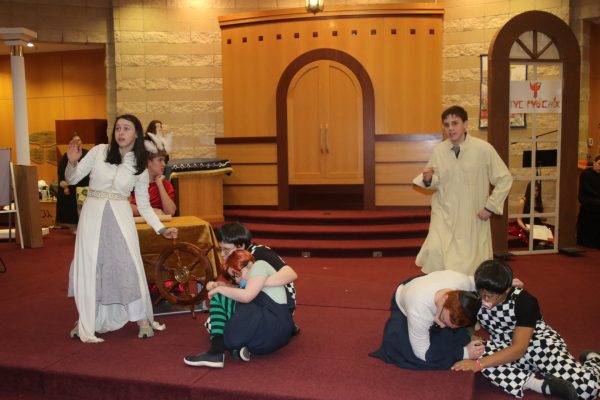Torah falls at local synagouge
Torahs sit in the ark in the Beit Midrash at CESJDS.
November 3, 2021
Rabbi Brahm Weinberg was sitting in the front row of the Kemp Mill Synagogue when the unthinkable happened – the Torah fell out of the ark.
After the gabbai gave the Torah to the chazzan, they turned their backs to the ark. The second Torah was supposed to be resting safely against the back of the ark. But it began to fall, and the congregation watched as it hit the floor.
“I was paralyzed. I was stunned,” Weinberg said. “I was shocked and didn’t know what to do.”
This was the first time Weinberg has seen a Torah hit the ground in his 12 years of being a rabbi. He said his immediate concern was to put the Torah back.
There were no restraints inside the ark to prevent such a fall. Weinberg said he is already talking to woodworkers about adding chains or wooden holders to prevent a recurrence.
“I tried to […] calm them down, because the people were really worked up, […] and to give them some guidance, halachically speaking, [on] how they should react to this,” Weinberg said.
Weinberg also wants to use this point to reconsider how people treat the Torah. He said the problem was that the congregation was feeling a “disgrace of the Torah.”
When the Torah fell there were about 30 people in the Rosh Chodesh service. According to Weinberg, the whole congregation was equally stunned.
“People were horrified–here was literally a gasp in the room like, ‘Ah!’ I could hear it in the room, […] and some of the people had their hands over their mouths, they were in shock and very shaken up.” Weinberg said, “People came to me later that day [and] the next day and said this really affected them.”
After the Torah was put back into the ark the service continued smoothly. Only after it concluded did Weinberg address the congregation on whether or not they should fast.
The widespread misconception is that when a Torah is dropped, everyone who witnesses it must fast for 40 days. In the magazine Jewish Action, Rabbi Dr. Ari Z. Zivotofsky wrote that this custom is a post-Talmudic tradition that started off as the person who dropped the Torah fasting for one day. Many people who were at the service have already fasted for one day.
“I suggest that people try to fast if they can,” Weinberg said. “Because it’s a custom, not a requirement, I told people that if they’re really bad fasters, or they get very sick, or it’s going to prevent them from going to work, they don’t need to fast.”
Weinberg said that it was nobody’s fault, but hopefully in the future they will be more prepared.
“What I tried to reinforce […] was that mistakes happen, these things happen. All Hashem can ask of us is that we try our best,” Weinberg said. “Will a Torah fall in the future? I’m sure it will.”


















Josie • Nov 5, 2021 at 9:34 am
Beautiful, moving, Pulitzer Prize worthy. In today’s world of misinformation, fake news, half truths and alternative facts it is more crucial than ever to protect the first amendment and institutions of truth and honesty this country was built upon. I greatly look forward to more articles by this young diamond in the rough, this young truth seeker. I will be refreshing the website in hopes of his words of truth gracing the front page. Thank you